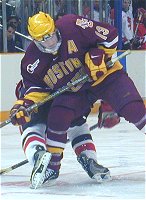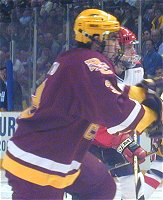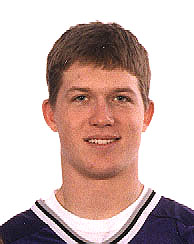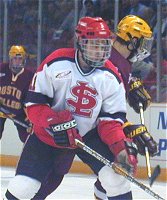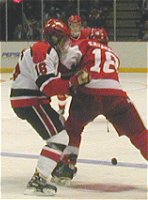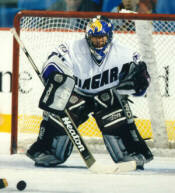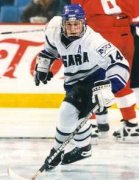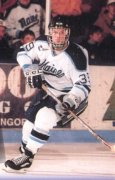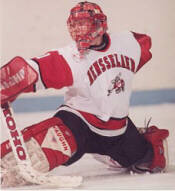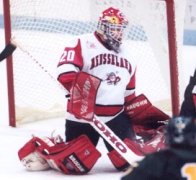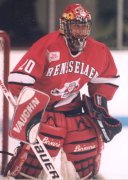We’re down to four.
Thursday in Providence, R.I., championship contenders North Dakota, Maine, Boston College and St. Lawrence meet to decide the participants in Saturday’s title game — the culmination of another season of college hockey.
Without further ado, the national semifinalists:
North Dakota (29-8-5) vs. Maine (27-7-5)
Thursday, 2:00 p.m. ET, Providence Civic Center, Providence, R.I.
North Dakota Fighting Sioux
Dean Blais may know who his starting goaltender is going to be when his Fighting Sioux play Maine in a national semifinal on Thursday. If he does, he has quite a poker face.
The North Dakota coach said he won’t be tipping his hand until Wednesday, the eve of his team’s first appearance in the Frozen Four since it won the national championship in Milwaukee in 1997.
But that won’t stop people from guessing.
The Grand Forks (N.D.) Herald conducted an online poll, inviting readers to vote for whom they feel should be between the pipes against Maine. The results didn’t tell much, except that both Karl Goehring and Andy Kollar have a fan base. Goehring edged out Kollar 52 percent to 48 percent.
The goaltending question has been a weekly feature for the Sioux since the Western Collegiate Hockey Association Final Five. The week of the tournament, Goehring suffered a concussion during practice and hasn’t seen action since.
He came close in the national quarterfinal game against Niagara in Minneapolis, when Kollar got hammered by a Purple Eagles player. Goehring hopped off the bench and started stretching, but Kollar stayed in the game.
But this week, the tables may have turned. Blais said Goehring is the one that’s at 100 percent and Kollar is the one coming off an injury.
“It looks like both are ready to go now,” Blais said. “Andy … had a little stiff neck and everything, but he practiced (Thursday) and was OK. Karl, we were supposed to take the day off (Thursday) and he was out with the puck-shooting machine. It looks like he’s 100 percent now.
“They’ve kind of traded off, back and forth with their health.”
The fact that Kollar got hit against Niagara probably wouldn’t concern Blais all that much if it was the first time it happened this year. Instead, both Kollar and Goehring have received their share of hits this season, despite the implementation of a point of emphasis in the rules that players are supposed to avoid contact with the goaltender.
“You want to coach players to go to the net, but you don’t want ever to touch the goaltenders,” Blais said. “We’ve had four or five cases this year of both our small goaltenders getting run over. During the regular season, if I was out there and ran a goaltender, I’d really be worried about a defenseman clunking you.
“They’re well-padded and everything, but they’re so vulnerable. They’re looking at the puck and someone comes in and cheap shots them, well, usually the defenseman’s the closest guy, is going to pound knots on their head. You can’t with the fighting rule the way it is.”
Pounding knots into an opponent’s head, of course, is frowned upon by officials, to say the least. But playing against Lee Goren in a tournament is enough to give an opponent a pain in the neck.
Goren’s play in tournaments this season has been phenomenal. He had a goal against Niagara, two goals and an assist in each of his two games in the Final Five, two goals and an assist in Game 3 of the first-round series against Denver and three goals in two games at the Badger Showdown in December, including the game-winner in overtime in the championship against Wisconsin.
He was the most valuable player of the Final Five and the Badger Showdown. He has 32 goals and 60 points. What more can you say about the guy?
Blais found another honor to place upon the senior’s shoulders after the win over Niagara. He dubbed the forward “Scorin’ Goren.”
“He sat up in the stands and watched us three years ago win the national tournament because he had to sit out because he played major junior,” Blais said. “He knows how awesome it was and he’s one of our captains and he’s done everything he’s capable of doing to get us back there.”
Goren is one of five seniors on the team. He, Tim O’Connell, Jason Ulmer, Peter Armbrust and Brad DeFauw were a part of the national championship team in 1997 and bring a knowledge of the Frozen Four to a team that, otherwise has no experience in college hockey’s biggest event.
“We have five of them that know how it feels,” Blais said. “Not that they’re our best players because it’s spread throughout the lineup, the contributions. They’ve been there, they know what it takes. If you have no leadership, you have nothing.”
Goren may be Mr. Tournament, but Jeff Panzer has been the consistent presence the team has needed throughout the season. He scored three assists against Niagara to bring his point total to 63 this season (19 goals, 44 assists).
Then there’s Goren’s center, Ulmer, who has 11 points in his last four games. Put them together and you have a potent offense that has led the Sioux to an 11-1-3 record in their last 15 games and has them playing their best hockey of the season.
“I think we’ve peaked at the right time,” Blais said. “Certainly, it all has to do with intensity and we’re intense.”
Experience on the blue line is what separates this North Dakota team from the ’97 squad. Whereas the ’97 Sioux defensive corps was full of veterans, this year’s group is dominated by freshmen and sophomores.
In the WCHA final against Wisconsin, Blais sent out two freshmen (Travis Roche and Chris Leinweber), two sophomores (Chad Mazurak and Aaron Schneekloth), a junior (Mike Commodore) and a senior (O’Connell) to the blue line.
And that defense will be put to the test against Maine. Blais predicted it would be a “skater’s game,” matching the fastest team in the WCHA with the fastest team in Hockey East.
“It’s not going to be like the game against Niagara, where there was hardly any checking,” Blais said. “That was more of a game of puck possession and movement and trying to get to the net because they’re real defensive. With Maine, it’s going to be all the little battles. Faceoffs, cycling of the puck, getting the puck to the net, all those things are going to come into play to beat Maine.”
Maine Black Bears
In the East Regional, Maine trailed Michigan, 1-0, heading into the third period before exploding to a 5-2 win. Perhaps more impressive than what the Black Bears did was how they did it. They scored one power-play goal and added one more tally from each of their four lines.
“That’s our team,” says coach Shawn Walsh. “We don’t have one guy who is a go-to guy or one guy who is a Hobey Baker finalist. We don’t have anybody like that. We’re more of a four lines and six defensemen team. That’s carried us all year.”
That and some very much underrated goaltending by Matt Yeats.
“Since we made the decision to make him our number one goaltender, he’s given us terrific goaltending down the stretch,” says Walsh. “He’s exactly what you want as a coach. He’s got a calmness that is tremendous.
“He’s right on top of his game. Our last three games were against teams that were in the Final Eight at least — [Boston University, Boston College and Michigan] — and he’s given up a total of five goals in those three games.
“His goalie mask depicts him as a person. He has nothing painted on it, and he doesn’t want anything painted on it. That’s the way he is in the net.”
Maine’s depth, however, will be sorely tested by the absence of leading scorer Cory Larose. In the final minutes of the game against Michigan, Larose was assessed an agonizing game disqualification for butt-ending. As a result, he will be sidelined for the North Dakota contest and must hope that his collegiate career doesn’t end with a whimper in the stands, but rather a bang on the ice in the championship game.
When asked about the fairness of the game DQ, Walsh says, “If I did touch upon it, I might get in trouble.”
Having spoken volumes with that non-answer, Walsh explains how he plans to adjust for Larose’s absence against North Dakota.
“What we have to do is replace his 20 minutes of ice time,” says Walsh. “The guy who comes into the lineup will probably get about eight minutes and then we’ll have to make up the other 12. I think we can handle that.
“[Ben] Guite can handle another minute or two. [Barrett] Heisten can handle another minute or two. Brendan Walsh can handle a minute or two. Tommy Reimann, who is really coming on for us now, is definitely going to handle it with a few more minutes. That’ll be fine.
“Balance is the nature of our team and I’m a big believer that [one] individual’s misfortunes are another individual’s opportunity. That’s exactly how we’ll represent it.”
In particular, Reimann will move into Larose’s spot on the left wing alongside Guite and Niko Dimitrakos. Freshman Mike Schutte, an offensive defenseman who spent some time up front in his 22 games, will take Reimann’s place on Maine’s “Blue Line” with Lucas Lawson and Matthias Trattnig.
Reimann amounts to the wild card in the reshuffled deck. He redshirted last year as a result of eligibility problems and then missed three months this season because of a concussion.
“In essence, he’s playing his 18th or 20th game in two years and he’s just getting into game shape,” says Walsh. “He set up two beautiful goals in the game against Michigan. Just great plays.
“He’s got tremendous sense for the puck and a real jump to his step…. He’s become a major league factor for us in the playoffs.”
In fact, Maine’s record with Reimann in the lineup is 17-1-2 compared to 10-6-3 without him. Almost certainly, a good chunk of that is coincidence. Maine opened 6-0-1 (with Reimann) and is now on a 12-1-1 tear (of which he missed one game). But his return certainly has had a very positive impact on Maine’s impressive stretch run.
However, the Black Bears are far from the only hot team.
“Looking at the way these four teams have played since early- or mid-February on, you have the four best teams [in the Frozen Four],” says Walsh. “[If you look at] their records and who they’ve beaten and how they’ve played, all four teams are on a major roll coming into the tournament. That makes for excitement and you always want the best field when you get to this level.”
What does separate Maine from the other three contenders, however, is that the Black Bears are the reigning champions. They’re looking to become the first team since Boston University in 1971 and 1972 to win back-to-back titles.
“The experience of last year will certainly help us,” says Walsh. “The issue of repeating can sometimes be a difficult thing during the course of the season when you’re in the dog days of January or even December and you don’t see the light at the end of the tunnel.
“[But] once you get to this time of year, it’s an excitement thing. We like to be looked on as special. We’d love to have the opportunity to leave a legacy.
“We’re fully aware that we’re going to have to play three great periods to have a chance to play the last three periods.”
Boston College (28-11-1) vs. St. Lawrence (27-7-2)
Thursday, 7:00 p.m. ET, Providence Civic Center, Providence, R.I.
Boston College Eagles
If Boston College plays the way it did against Michigan State in the NCAA tournament’s first round, the Eagles will probably leave Providence disappointed. Many title-winners dodge one bullet; fewer survive two. If, on the other hand, they play the way they did against Wisconsin in the second round, look for a BC national championship.
The Eagles became the only team to reach the Frozen Four without a bye, but not without a major scare against the Spartans. BC fell behind, 2-0, and needed a six-on-four goal in the final minute of regulation to tie it. In overtime, the Eagles then capitalized on an MSU five-minute major to score the game-winner.
“Our season was going to end if we couldn’t tie it [in regulation],” says BC coach Jerry York, “but Mike Mottau made an unbelievable play to bring it back out front to Mike Lephart, who scored. It went into overtime and Jeff Farkas, who has been one of our key players all year, deposited an overtime goal.”
In all, the Eagles scored five goals on eight power-plays. That showed great strength against one of the nation’s top penalty-killing teams, but BC can’t count on duplicating that in Providence.
What would make for much better odds at winning it all would be a repeat of the defensive performance the Eagles displayed against Wisconsin. In particular, they shut down the Badgers’ vaunted top line of Steve Reinprecht, Dany Heatley and David Hukalo, holding the trio to just one shot.
“Our forwards did a good job of trying to contain on the forecheck and kept pucks in their end,” says York. “[That] limits the times that [our opponents] will handle the puck. And we got a tremendous job out of our five defensemen.
“Mike Mottau played 32 minutes and was instrumental in breaking the puck out of the zone and defending. And we got some bounces, too.”
That defensive strength could be the big difference between this year’s Eagle squad and the last two which advanced to the Frozen Four but lost in overtime (to Michigan in the 1998 title game and to Maine in the 1999 semifinal).
“This particular team is better than the last two teams just because of our defense,” says York. “We’ve always been noted as an offensive get-up-and-go club, but this particular year we’ve been a little inconsistent on offense, but very, very consistent defensively.
“In our league, we played 24 games and gave up 50 goals. That was 17 less goals than we did last year in the same amount of games against the same opponents.
“So I feel very good about our club. We’re better defensively from the goaltender out to the forwards.”
That goaltender, Scott Clemmensen, has been red-hot since almost losing his spot in the rotation in mid-January. At the time, freshman Tim Kelleher was outplaying the junior by a good margin. After Kelleher won the first of a two-game set at Maine, York considered coming back again with him in the second contest. Instead, York stuck with Clemmensen and the veteran responded with a shutout.
And then another shutout. And then another. The three consecutive blankings propelled Clemmensen into a torrid stretch run in which he took over the number one job and then proved his mettle in the postseason.
“During his first two years, his save percentage hovered around 87 or 86 percent, yet he was able to win hockey games,” says York. “This particular year, he’s well into the low 90s. I credit that with the real good competition from our freshman Tim Kelleher.
“They alternated most of the season. They were good for each other. It’s a healthy competition to push Scott.
“Right now he’s playing as well as he ever has in the three years with us. I feel very, very good about him.”
York also has to feel good about the advantages inherent in returning to a third straight Frozen Four.
“Experience certainly is a factor,” he says. “The more big games you play in national tournaments, [the more] it helps your team with poise and handling distractions better.”
While holding all the experience cards against St. Lawrence, however, the Eagles won’t have that trump in the title game, if they advance. Maine is the defending national champion and North Dakota still has some seniors who were freshmen when the Sioux won it all in 1997.
Even so, the Eagles look like the complete package: offense, defense and experience. No one else has quite as good a combination.
St. Lawrence Saints
It’s been years in the making for the St. Lawrence. Years in the making to get back to the Frozen Four.
Back in 1988, in Lake Placid — the land of American heroes — the Saints lost the NCAA championship game to Lake Superior State in overtime. It has taken 12 years for the Saints to make it back to the big stage.
The Saints had a chance in 1992, after they won their last ECAC championship prior to this season. But it didn’t quite work out as the Saints lost to Wisconsin in the quarterfinals. It’s taken this long. Years in the making.
This season, though, the Saints captured a bye in the ECAC championship by exorcising the ghost of Lake State, winning the title in Lake Placid to go along with the regular-season championship. This year, the Saints took advantage of the bye and are now back in the Frozen Four.
An unbelievably classic national quarterfinal against Boston University sent the Saints to the Frozen Four when Robin Carruthers knocked his own rebound past Rick DiPietro to send the Saints on to Providence after 123:53 of playing time.
“The last time we had an opportunity in 1992, we had a bye and we lost to Wisconsin, and from there on we never felt we took advantage of the bye,” said Saint head coach Joe Marsh. “We said that we wanted to make it a factor in the game — and we thought that fatigue could be a factor, and let me tell you that it certainly was.
“Both teams played unbelievably well, I thought, and just so hard. Chances on both sides. It was one of the greatest games, maybe the greatest game, I’ve ever been associated with.
“I guess it’s just a feeling of relief to come out on top. It’s too bad anybody has to lose that game. I just couldn’t be prouder of all of our guys. They’ve worked so hard. They’ve worked so hard and had such a high agenda this year. Every single guy, whether they were dressed for this game or not, has contributed so much to this team that it’s unbelievable.
And that is the key to the Saint team. The Saints run deep up front with four lines and six outstanding defensemen.
“We try to play a well-balanced attack with four lines, and we have had contributions from a load of guys. The young guys have stepped up and the role players played their roles,” said Marsh.
The top two lines for the Saints can be explosive and they came together in mid-January when the Saints were mired in a slump that saw frustration and questions about what was wrong with the Saints. After a loss and a tie to Wisconsin, the Saints went on a roll. Since that point, the Saints are 18-1-0 — some of which has to do with the adjustment that Marsh made to his top lines.
Marsh initially started the season out with Erik Anderson and Brandon Dietrich on the same line, but then shifted them. Anderson went to center Jason Windle and Al Fyfe, while Dietrich centered Mike Gellard and Andy Marchetti. Moving Marchetti to Dietrich’s line helped out both, and splitting the two centers helped out the entire team.
But what may make the Saints special are the third and fourth lines. Early on in the season, Marsh knew that it would take four lines.
“When we’ve had teams that have won championships we’ve always had above average third and fourth lines to where it makes the job as a coach easier,” Marsh said before the season began. “We have a lot of confidence in them. We’ve platooned a lot of kids last year and they have experienced. We have a bunch of guys that have played 18-20 games. There are some younger players that are working their way in there.”
And those players have stepped up. The Muir twins — Sean and Mike — along with Charlie Daniels or Blair Clarance have formed a line, and Jim Lorentz with Robin Carruthers and Jack O’Brien have given the Saints that depth they were looking for.
Back on defense the Saints are rock-solid. Led by co-captains Justin Harney and Dale Clarke, the Saints possess one of the best group of blueliners in the country, offensively and defensively. Matt Desrosiers, Kevin Veneruzzo, Josh LeRoy and Ray DiLauro comprise the most often played six-man unit for Marsh.
“We’ve got two premier defensemen and I like the defensive mentality and they are led by Harney and Clarke,” said Marsh. “Those two guys are very hard workers and can log a ton of ice time. They can work both ends, and Justin is one of the premier offensive defensemen in the league. Both of those guys give us a chance to play a high-tempo transition game.”
The biggest question mark was in goal coming into the season, but ECAC Rookie of the Year Derek Gustafson has made it an exclamation point instead.
“We’ve got two juniors (Sean Coakley and Jeremy Symington) that we were confident in, but we just figured for our third goalie we were just going to bring in the best guy possible,” Marsh said of “Gusto.”
“I guess we didn’t realize that he was going to elevate his game to this point. He just kept progressing.
“We really went with three guys through the 15th or 16th game of the season and they all did a great job. Their numbers are good, but this guy just kept progressing and his numbers were that much better, and [he] played in some bigger games. I think the team developed the chemistry around him.”
Up and down the line the Saints are formidable in any game. But this next game is not just a game, it’s the national semifinal.
“I guess I’d be lying if I told you that there was always that thought, ‘Are we ever going to get back to that point?'” said Marsh about the Frozen Four. “My brother said after we lost that game to Lake State in ’88 in overtime, ‘Geez, will we ever get a chance to do that again?’
“You figure BU and Michigan and Maine. For us, it’s a long time coming. We just hope we can go in there like we did in this stage of it, just go in and put our best foot forward.”
In 1992, the Saints were the favorites. In 1988, the Saints were not the favorites, but they got there to that championship. This year, the Saints certainly are not the favorites, and it will take everything they have to move on when they face Boston College on Thursday evening.
“I don’t know who the favorite is, but I know who the underdog is,” stated Marsh. “We have tried to impress on the guys that we could take the experience we had last year. [The other teams have] been there and they certainly have a nucleus of players that have been there and won National Championships.
“For us it’s real important to play as much of our game as possible. [Boston College is] a team that’s difficult to match up against. They have great special teams and they have all the components of a championship team.
“The big thing for us is the mental preparation to go in and draw off the energy of a tournament like this. It will be the biggest tournament anyone has ever played in. We have to stay focused on what we have to do. We have a lot of preparation to do, but the mental part of it is to prepare, to enjoy, but not to get our heads into the clouds.
“The most important thing is how we approach this thing mentally.”
The time is nearing for Marsh and his Saints. The former chair of the NCAA Championship Committee has his team in the tournament for the second year in a row, and have advanced to the Frozen Four for the first time since 1988. It’s something special and something that was years in the making.
“To finally get back and be part of this, the last time we were in this was in Lake Placid and we lost the national championship game in overtime to Lake State,” reflected Marsh. “We had some down times there and some years that it takes to rebuild. My feeling is that this team just worked so hard and stayed on such a high agenda, avoided distractions and stayed disciplined. They did everything we asked them to do. There’s a feeling that they deserve to be part of something special and get to go to this. It’s a great feeling.
“I think these guys are going to probably realize the significance of this season and what they’ve accomplished through such hard work. It’ll probably take a few months to sink in, but right now I really want them to enjoy it and appreciate every second of this. This is tough to do. That’s why winning championships mean so much — it’s so hard to do. I think all of our guys have a good consciousness about how special this is because they did it together.”
Todd D. Milewski’s Picks:
North Dakota-Maine: This game pits two of the hottest teams in college hockey against each other, with speed against speed. Maine may take advantage of the North Dakota defense, but the Sioux can outgun the Black Bears. UND 6, Maine 5
Boston College-St. Lawrence: For the second straight year, BC has knocked out the WCHA regular-season champion in the NCAA quarterfinals. They have proved time and again they deserve to be in the Frozen Four, and they’ll prove they deserve to be in the national title game. Boston College 4, St. Lawrence 2
Championship: Back in 1997, the Sioux downed Boston University to win the title. I’m sure they won’t mind doing the same to the Terriers’ crosstown rival. North Dakota looks extremely impressive at this time of the year, and that makes them my favorite to win the title. UND 5, BC 4
Dave Hendrickson’s Picks:
BC-St. Lawrence: The Saints are very, very good. The Eagles are even better. Boston College 3, St. Lawrence 1
Maine-North Dakota: The absence of Cory Larose looms pivotal. It not only takes Maine’s top scorer out of the lineup, it strikes a blow at the depth that has been the Black Bears’ biggest strength. North Dakota 3, Maine 2
Championship: BC haters will have to send that “1949!” chant to the dump. Boston College 4, North Dakota 2
Becky Blaeser/Jayson Moy’s Picks:
St. Lawrence-Boston College: This is a tough one. The Eagles are on a roll, but then again, so are the Saints. The difference will probably come down to which defense will play better. In other words, Mottau and Orpik against Harney and Clarke. The Saints are a little deeper on defense than the Eagles, and experience could be a major factor. Strong goaltending and good offense from both sides will make this an exciting one. St. Lawrence 4, Boston College 3, 5OT
North Dakota-Maine: Both teams can sure light the lamp from all angles. Two good goaltenders and two good defenses. How much the absence of Larose hurts Maine could be a key question, but this battle comes down to Goehring and Yeats. North Dakota 3, Maine 2
Championship: We’re predicting a North Dakota-St. Lawrence final. Both teams grind it out, but in the end the men from Grand Forks skate away with the title. North Dakota 4, St. Lawrence 2

